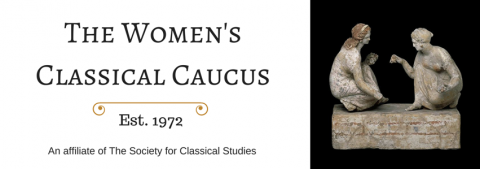In Part 2 of our guest series for the SCS Blog, the Women’s Classical Caucus (WCC) invites you to celebrate the winner of its 2020–2021 Leadership Award: Suzanne Lye, Assistant Professor of Classics at the University of North Carolina at Chapel Hill. The award recognizes Dr. Lye’s extraordinary leadership and initiative in establishing, administering, and fundraising for the SCS-WCC Covid-19 Relief Fund. Since April 2020, this emergency microgrant fund has distributed no-strings-attached awards of up to $500 to North American classicists in need.
When COVID-19 hit the U.S. in March, disrupting lives and exposing equity gaps in our field, Dr. Lye brought the idea of a “Covid Relief Fund” to the WCC Steering Committee and SCS leadership. Modeled after the Sportula, the goal of this fund was to give emergency funding to graduate students and contingent faculty who were in particularly difficult financial situations as a direct result of the pandemic. Using $15,000 in seed money from the WCC and SCS along with additional grants and support from CAMWS, CAAS, and CANE, Dr. Lye set up a simple application form and worked with SCS Executive Director Helen Cullyer and a selection committee to process applications and distribute grants quickly. They disbursed the first round of grants in early May 2020.
In the eleven rounds of awards since its launch in April 2020, the Covid Relief Fund has raised over $106,000 through donations and an auction fundraiser. It has thus far disbursed over $100,000 to more than 200 recipients. Most (77%) of the Covid Relief Fund applicants are graduate students and need money within 1–2 months for basic necessities, such as rent, groceries, medical and mental health care, childcare, and research resources. About a third of the applicants self-identify as archaeologists or art historians; the rest are scholars studying philology, history, philosophy, classical reception, and related subjects.
Learn more about Dr. Lye’s amazing work and leadership from the interview below. And stay tuned for the third installment of our three-part series on WCC 2020–2021 Award recipients! (N.B. The answers below have been lightly edited for length and clarity).

Image: Blue sea with waves. Image courtesy of Freepik.
What does leadership mean to you, and what are your goals as the leader of the WCC/SCS Covid Relief Fund and now as WCC co-chair?
For me, leadership is about noticing where there is a need and then taking steps to fill that need, whether taking action myself or helping to coordinate others to take action. It requires purpose, focus, and follow-through. In general, my goal is to amplify and activate people so they recognize their own power and learn to channel it in pursuit of our common goals.
I take a service-forward approach. I’m always looking for where I can help and make life a little easier and better for others. I don’t think I do anything particularly extraordinary — I just try to do extra of the ordinary and hope I can have an impact. The SCS-WCC Covid-19 Relief Fund is one of the initiatives in this spirit of service and care for others.
What have you learned from running the Covid Relief Fund? Who are the recipients? What are your hopes for the fund’s future?
First, sometimes the best way to help people is to just give them money, even if it is a modest amount, and trust them to spend it on what they need.
Second, the Covid Relief Fund is also about creating a community of care where people know that they have somewhere to go when they are in need of a small, fairly quick loan.
And third, most people in our field are extremely generous, both with time and money. We have several donors who have given over a thousand dollars and some that give $5/month. People want to help and support each other. The challenge for leadership, therefore, is to find and create opportunities to connect those in need with those who can help.
The target audience to receive the microgrants are graduate students and contingent faculty, two of the most financially vulnerable groups within our field.
What I have learned is that this group is resilient, passionate about their work, and committed to our field. They are under an incredible amount of financial stress and general anxiety about the future, yet they are doing everything they can to stay in Classics. I have also learned how humble and generous this group is. We have had a few people request less than the $500 maximum or even decline the award because they managed to get funds elsewhere between the time they applied and received our notification, saying they wanted to make sure our limited funds went to someone who might need it more.
My hope is that we no longer need a Covid Relief Fund because the pandemic will be over. I also hope that the Covid Relief Fund transforms into a permanent microgrant fund at the SCS, open to anyone in our field who needs immediate financial assistance. Nandini Pandey has a quote in her article about the Covid Relief Fund that I think of often as a guiding principle: it is about how a whole kingdom fell for lack of a single nail in a shoe. I think there should always be a microgrant fund in our field with flexibility as a “fund of last resort,” in addition to other awards and funds that are given on an annual basis. We all need to know that our community supports us and we have somewhere to turn.
What challenges do you foresee the pandemic bringing for the field in general?
The challenges for the field and for academia have been well documented, from job loss to lack of access and loss of resources or community. These problems all existed before the current crisis, though, and there has been hidden suffering for a long time. The pandemic has made this more visible. The field as a whole now better recognizes the urgency of the situation, and people are taking action.
I do think we need to balance any conversation about the challenges to our field with discussions about the opportunities. This year’s WCC public advocacy awards all celebrated groups that work on collaborative projects which involve sustained work by multiple people at various career stages. This is definitely true of the Covid Relief Fund. I share this award with everyone who worked on different aspects of developing it and keeping it running — Helen Cullyer at the SCS, the WCC Steering Committee, and the Covid Relief Fund selection committee members, as well as individuals like Liv Yarrow and Yurie Hong, who came up with the idea for the highly successful Covid Relief Fund fundraising auction and volunteered to run it. We are a village, and each of us can be active at different times and have a role.
What advice can you give to people looking to help during the pandemic?
Look for tangible ways to help colleagues — send them an email, forward them opportunities, offer to read their work, volunteer to be a mentor, donate to an organization you believe in (e.g. the Sportula, Sportula Europe, or the Covid Relief Fund), etc.
For those who have supported the fund, either with donations or with their labor, I want you to know that your support has made a real impact on people’s lives! Whether or not you’ve given, this is a great time to consider donating (again), if you’re able. The need is still great!
How does winning the WCC Leadership Award affect your work? What’s the next step?
My next step is to try to replicate the success of the Covid Relief Fund in new programming for the WCC to promote equity and belonging in our field. I just cycled into a role as co-chair for the WCC, and we will be using the Covid Relief Fund development and implementation process as a model for planning initiatives to support people at various stages of their careers and at different types of institutions. For graduate students and contingent faculty who are living in precarity, please submit an application. We on the Covid Relief Fund team continue to work hard to find the money to fund as many people as possible.
This award validates my belief that each of us, no matter our rank or role, can be a force for positive change in our spheres. We can each create ripples that eventually become tsunamis of change. The award also strengthens my sense of purpose in working on creating communities of care, both locally and within the field of Classics more broadly.
This blog post was produced by the Women’s Classical Caucus (WCC). The coordinators of this three-part series featuring WCC Award winners are Caroline Cheung and Suzanne Lye, co-chairs since January 2021 of the WCC. The WCC was founded in 1972 and is one of the oldest SCS-affiliated groups. The WCC seeks to incorporate feminist perspectives in the study and teaching of ancient Mediterranean cultures and strives to advance equity and diversity within the profession of Classics. The WCC is open to all. We welcome anyone who believes in our mission to become a member and participate in our exciting new initiatives as we head into our 50-year anniversary. (Click here if you would like to volunteer!)



